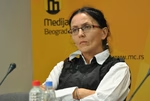
The Balkan Free Media Initiative (BFMI) has called on Meta, formerly known as Facebook, to take urgent steps to prevent abuse of their platforms and tackle the spread of disinformation in the Western Balkans in an open letter to the president for global affairs at Meta Platforms, Nick Clegg.
According to the BFMI report, “pro-Serbian propaganda is becoming increasingly prevalent in both Serbia and BiH, encouraging divisions and polarization between the nation’s different ethnic groups and creating major security concerns.”
It says that the calls for the secession of Bosnia’s semi-autonomous Republika Srpska (RS) entity and its unification with Serbia are “at the heart of this issue” and that disinformation has become an important tool for the Bosnian Serb member of BiH’s tripartite Presidency, Milorad Dodik, as well as other senior Bosnian Serb politicians, to “galvanize nationalist support for their secessionist ambitions.”
“This usually takes the form of denial of genocide and war crimes linked to conflicts following the break-up of Yugoslavia in the early 1990s. Serb revisionism sees war criminals painted as heroes and the Serbs as victims of western lies and conspiracies,” the report says.
According to the BMFI report, “strongmen leaders” have control over most mainstream media in places like Serbia and Republika Srpska and in such cases “social media can provide a crucial alternative platform for public discourse and serve as a tool supporting democratic participation.” It also notes that journalists and civil society groups around the world are “as concerned about the closing down of access to social media as they are about its manipulation by governments.”
“However, as this report shows, social media platforms are being weaponized by malign political actors in the Western Balkans to promote nationalism and authoritarian practices. A
rebalancing is necessary to ensure that social networks can provide value, rather than amplify disinformation in the rest of the media,” it says.
The full letter BFMI sent to Clegg follows:
“Dear Mr. Clegg,
Ahead of the presidential and parliamentary elections in Serbia on 3 April, we, the undersigned, call on Meta to take urgent steps to prevent abuse of their platforms and tackle the spread of disinformation in the Western Balkans.
In countries such as Serbia where traditional media are largely under the control of the state, social media are the last remaining lifeline for independent journalists and voices. As Europe experiences the first major conflict on its soil since the Balkan wars of the 1990s after Russia’s invasion of Ukraine, the role of these platforms in the wider information war can no longer be ignored. This is especially important in the Balkans, a region where Russian influence is keenly felt and where erosion of democracy is accelerating.
Facebook is by far the most dominant social media platform in the Balkans. In its report ‘Social Media and the Information War in the Balkans’ published this week, the Balkan Free Media Initiative examined the destabilizing effects of social media in Serbia and Republika Srpska, the majority Serb entity of Bosnia and Herzegovina (BiH). It found that Facebook and other platforms are being manipulated to spread disinformation and attack critical voices in an attempt to consolidate political power.
Meta’s current approach to removing false, misleading and inflammatory content is inadequate. The Balkans may represent a small and complex market, but its importance to regional stability should not be underestimated. It is crucial that social media companies act now to mitigate these problems and by extension support the ability for citizens across the Balkans to engage in meaningful democratic elections.
We call on Meta to apply the following recommendations to improve the quality of the information environment on its platforms:
1. Expand existing policies for labeling state-controlled or state-affiliated outlets
2. Introduce greater sanctions for outlets found to repeatedly violate content policies and publish disinformation
3. Expand the presence of social media companies in the Balkans
4. Escalate efforts to identify and remove troll and bot accounts
5. Develop algorithms that promote media outlets with high journalistic and ethical standards
6. Strengthen capacity to deal with information crises should the security situation deteriorate further in the Western Balkans
Without concerted action by Facebook and others, democracy in the Balkans will continue to suffer with potentially far-reaching consequences for the rest of Europe.”
The letter was signed by:
Antoinette Nikolova, Director of the Balkan Free Media Initiative
Peter Horrocks CBE, former Director of the BBC World Service
Mark Nelson, former Senior Director of the National Endowment for Democracy
Eric Jozsef, correspondent for Libération
Marion Kraske, former Director of the Heinrich Böll Foundation office in Bosnia & Herzegovina
Kakvo je tvoje mišljenje o ovome?
Učestvuj u diskusiji ili pročitaj komentare





 Srbija
Srbija
 Hrvatska
Hrvatska
 Slovenija
Slovenija


























































